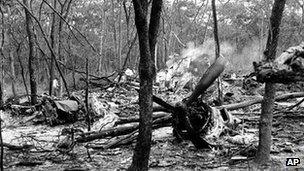Dag Hammarskjold death: UN 'should reopen inquiry'
- Published

The DC6 plane crashed in the early hours of 18 September 1961
A commission looking into the death of former United Nations Secretary General Dag Hammarskjold has recommended that the UN reopen its investigation.
Mr Hammarskjold's plane was travelling to Congo on a peace mission in 1961 when it crashed in Zambia.
A UN investigation in 1962 failed to find the cause of the mysterious crash.
The commission said there were significant new findings, and that the US National Security Agency (NSA) might hold crucial evidence.
In a statement, the UN thanked the commission and said the UN secretariat would study its findings closely.
It said Mr Hammarskjold had given "unparalleled service to the UN and paid the ultimate price", and that it was "among those most concerned in arriving at the whole truth".
The Swedish-born diplomat's plane crashed on 18 September in a forest near Ndola in Northern Rhodesia, now Zambia.
All but one of the passengers and crew on the flight were killed.
Mr Hammarskjold was trying to negotiate a peace agreement between Congo's Soviet-backed government and Moise Tshombe, who had declared independence for its mineral-rich province of Katanga.
The UN secretary general was going to Ndola to meet Mr Tshombe, who was backed by former colonial power Belgium and some Western mining interests.
Three investigations have failed to determine the cause of the crash, and many conspiracy theories have swirled around Mr Hammarskjold's death.
Two investigations held in the British-run Central African Federation, which included Northern Rhodesia, were followed by an official UN inquiry which concluded that foul play could not be ruled out.
The Hammarskjold Commission report, external, written by four international lawyers, said there was "significant new evidence".
It said the claim of an aerial attack, which might have caused the descent of the plane by direct damage or by harassment, was capable of being proved or disproved.
The report said that given the NSA's worldwide monitoring activities at that time, "it is highly likely" that the radio traffic on 18-19 September 1961 was recorded by the NSA and possibly also by the CIA.
The report said: "Authenticated recordings of any such cockpit narrative or radio messages, if located, would furnish potentially conclusive evidence of what happened to the DC6."
The Commission said it had made Freedom of Information Act requests to the NSA, which were rejected on national security grounds - but that an appeal had been lodged.
The report concluded that Mr Hammarskjold's death was "an event of global significance which deserves the attention both of history and of justice".
- Published17 September 2011